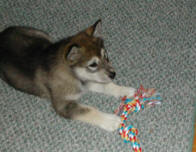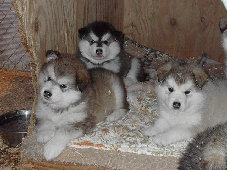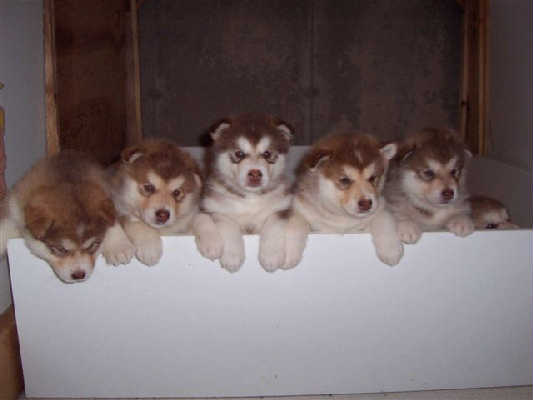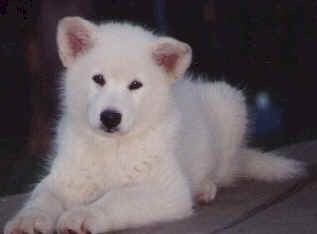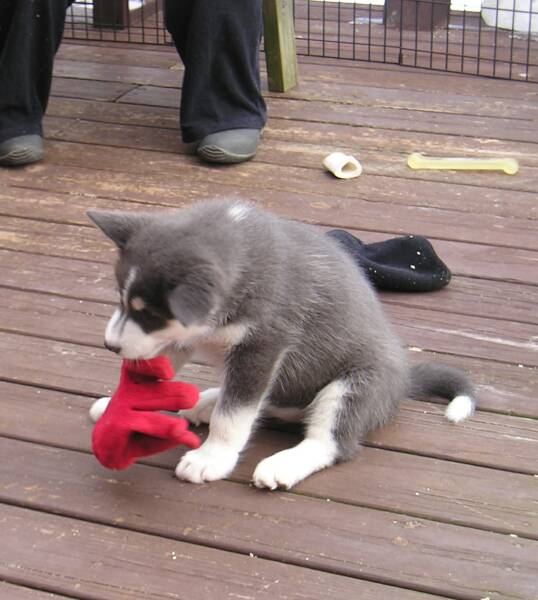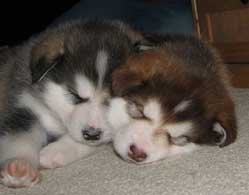Buying a puppy of a different color
As my coat color genetics website has been linked in more places, and more people have stumbled upon it, I’ve begun to get questions about purchasing puppies and asking where a puppy of one of the less common colors can be found. I’ve traded some wonderful emails with folks on this topic, and they were kind enough to let me combine our conversations into this page of information on the subject.
First, it is very important to understand that no good sled dog is a bad color. Put another way, this means that color should always be a factor of very low importance when a breeder plans a litter of Malamutes. Health and temperament are top priorities, with working ability and structure following right along behind. If you are purchasing a puppy it is very important that you make those the key things that are important, not color.
That said, I completely understand having a preference for certain colors. I’ll admit to a very strong color bias myself, and readily state that my favorite color is true Mahogany. I do not own a Mahogany Malamute, however, and it’s not because I don’t know where it’s possible to get one.
One of the difficult things to understand is that some of the less common colors are not often produced by responsible breeders. This happens for a variety of reasons, and does not mean that these colors are “bad” in any way. It’s just that the responsible breeders do not select for these colors or for that matter any colors – choosing instead to select for health, temperament, overall structure, and working ability. Because they are not selecting for specific colors, the less common colors are not produced very often. While I may love Mahogany, my preference for that color does not override the importance of getting a puppy who is healthy, has a good temperament, and who will fit in well with my family and goals. Those things are FAR more important in the long run than color.
There are breeders out there who make color a very important part of the decision making process when planning a breeding. I won’t go so far as to say that taking color into consideration as one of many important factors is always a negative thing, however planning a breeding program around one or two very specific traits (such as color or size) is always extremely dangerous. Doing this takes the focus off the overall goal of producing puppies who are healthy, have good temperaments, and who fit the description of
what a Malamute should look and act like.
So if you are interested in purchasing any puppy, but particularly a puppy of one of the less common colors, what should you be looking for in a breeder? Here are some general guidelines:
1) Color is not a measure of value.
Good breeders will evaluate their puppies based on temperament, working ability, suitability for various other activities, and potential as breeding stock. Their goal will be not just to find good homes for their puppies, but to match the right puppy up with the right home. Breeders may place different values on their puppies based on the particular puppy’s potential (for instance a puppy who will make a lovely companion may not be a good choice as a sled dog and may have faults that make it unsuitable for breeding, and so the breeder may or may not adjust the price). Responsible breeders do not, however, place different values on puppies based on unimportant characteristics like color. They do not use the term “rare” to promote their puppies of various colors, and do not charge different prices based on color. They may, however, charge less for a puppy with a fault that does not make them a good choice for a breeding program such as excessive white markings or a long coat – both of which are characteristics a quality Malamute breeder will select against. These puppies will be sold under a non-breeding contract.
2) Health is a primary consideration
There are no guarantees in life, however responsible breeders will do everything they can to assure that they are producing healthy puppies who will become healthy adult dogs. A reputable breeder will (at the very minimum) screen hips and eyes on all their adult dogs that they use for breeding. This means that the parents of their puppies will have an official hip screening (through OFA or PenHip) and an official eye screening (through CERF). Reputable breeders often go many steps further, screening for elbow, thyroid, and heart issues among others. Ask for copies of these certificates – don’t be shy, all good breeders will be happy to supply them. Ask about the grandparents, aunts, uncles, and cousins as well. A good breeder will be delighted to discuss any issues that have come up within the entire family.
Please beware of any breeder who says their line of Malamutes have never had any health problems. Often this will be used as justification for not testing, however it is impossible to know if an issue is there unless dogs are tested for it. Just like in human families, there are no families of Malamutes where health issues simply don’t exist. Good breeders do extensive research to understand what health problems have occurred in their lines and they plan their breeding program to reduce the odds of those issues happening again.
For more information on the many health issues that can occur in this breed please visit:
3) Good breeders care about what kind of homes their puppies go to.
Responsible breeders are not selling puppies so much as they are placing them in appropriate homes. They want to know that the new home is a good fit for the particular puppy and for the breed in general, and they want to assure that their puppy will have a home for life. Malamutes are darling puppies, but they grow up into large and extremely powerful dogs who are both very intelligent and have a mind of their own. They are not the right choice of dog for every home, and a good breeder knows this. For this reason, reputable breeders ask lots of questions of anyone interested in their dogs. For a good breeder it’s not just a matter of who has the money for a puppy. They care far more that the puppy is going into the right home, and into a home that is prepared to care for this challenging breed. Good breeders also care about their dogs for the lifetime of that dog. They work hard to be sure their puppies are placed in permanant homes the first time around, however if something unexpected should happen a reputable breeder will always take back any dog they produced. They also provide support and guidance whenever it is needed for the people who purchase their pups, and continue to do so for the lifetime of the dog.
4) Puppies should always be carefully matched with their new families
Responsible breeders do not allow new owners to pick out their puppies at a very young age based on the order in which payment is received. Quality breeders evaluate their puppies as they are growing up, and they understand that different puppies in a litter will have different temperaments. They are looking at temperament as well as other characteristics, and are knowledgeable enough to know what kind of personality will match well with a particular kind of home. For instance, a puppy with a temperament that is a good match for a working home where he gets to run in harness every day might be a very poor match for a home that likes to take a mellow walk a couple times per week. A good breeder continues this evaluation as the puppy grows, and carefully matches puppies with homes that have expressed an interest in them. Color should not play an important role in this decision, though most good breeders will take the owners preferences into consideration.
5) Good breeders are actively involved in dogs.
Reputable breeders do not “just” breed dogs. Instead they are involved in the breed in some way. They will show their dogs, participate in obedience/rally/agility, work their dogs in harness, weight pull, or regularly participate in some other form of activity with their dogs. They often will be be involved in local dog clubs or organizations. Usually their dogs will have titles (extra letters before and after their names) signifying that they have achieved certain goals in whatever activity they are involved in. This active involvement
beyond the dogs in their own backyard gives breeders greater perspective on their own dogs and serves as an opportunity to learn. These breeders don't just breed their dogs to make puppies. Instead they are breeding with specific goals and objectives intended to produce a puppy to keep for themselves that meets their own criteria for excellence in health, temperament, and structure. The emphasis is on producing a dog who is not just a wonderful pet but who also is capable of excelling at a structured and often competative activity.
All of these things are primary considerations in choosing a breeder from which to purchase your new family member. Color should really be of little importance, and yet I know it can be a factor that can hold a certain amount of weight. For those who do have a strong preference, I encourage patience. While certain colors may not be quite so common as others, there are few that would be considered hard to come by. Red, for instance, is in no way a scarce color. There are many reputable breeders who produce reds on a regular basis. Searching for a breeder who emphasizes health and temperament and who also produces the colors you are interested in may take a little more time and effort, but it is well worth it in the long run. Don’t limit yourself to local breeders, and be prepared to wait for the right puppy to be born if you have to.
In your search for a puppy you may run across individuals advertising any of the following:
“Rare” anything (be it color, size, coat length, or some other characteristic)
Puppies available on a regular basis (more than a couple litters per year)
Prices based on unimportant characteristics like color, size, or coat length
Dogs who do not have titles themselves but are listed as “from champion lines”, “from champion weight pull lines”, etc.
Website where the primary focus is on selling puppies
All of these things are red flags that suggest you should take a very close look at the breeder. Chances are good that you can do much better. If you are starting your search for a Malamute puppy I strongly recommend the following resources:
Alaskan Malamute club of America
Alaskan Malamute Club of Canada
And if you are not absolutely dead set on a puppy, I encourage you to go to the VERY best source of Malamutes of all colors, styles, coat types, and sizes - and the source that comes with the added bonus that you get to save a life. Malamute rescue has many stunning dogs looking for homes.
Malamute Rescue in the US
Malamute Rescue in Canada
